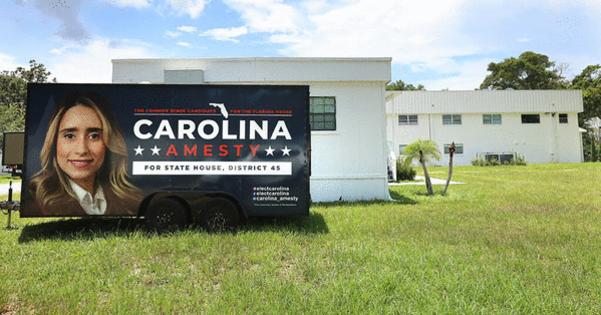Florida agency stalled revelation on state Rep. Amesty's family school until after election
Published in News & Features
ORLANDO, Fla. — After two weeks of silence, a Florida agency disclosed it has granted a short license extension to state Rep. Carolina Amesty’s family-run school, which is embroiled in the forgery indictment against her.
The revelation did not come until roughly an hour after ballot counting confirmed that the lawmaker had lost her reelection bid.
It settles the questions surrounding the Commission for Independent Education vote in a public meeting Oct. 22 on Central Christian University’s request for the license extension, which was needed for the school to continue advertising bachelor’s and master’s degrees in secular subjects. During the meeting, commission board members never indicated whether they were granting the request.
Just a week earlier, the Florida Department of Law Enforcement had released a report concluding Amesty “defrauded” the state by forging a signature on a key piece of Central Christian University’s initial licensure application.
The ongoing FDLE investigation prompted a grand jury to indict Amesty in August on four felony charges related to the school’s state licensure application, which she notarized while serving as an administrator in 2021.
Amesty lost her reelection campaign this week by a slim margin, as Democrat Leonard Spencer won 50.8% of the vote.
Spencer, a former Disney executive, is set to represent Florida House District 45, which encompasses much of southwestern Orange County, including Horizon West, Windermere and Disney World, and a slice of northwestern Osceola County.
Amesty was previously a vice president for Central Christian, a role she touted during her first campaign for state House two years ago. Her family continues to run the school on North Hiawassee Road in Orange County, with her father, Juan Amesty, serving as its president.
Institutions that only offer religious programs, as Central Christian once did, do not need licenses to operate in Florida. But the small college applied for a license in 2019 when it decided to expand and offer secular programs in areas like business management and political science. Florida first granted Central Christian’s application in 2022 and renewed it last year.
The virtual meeting of the Commission for Independent Education board on Oct. 22, which a Sentinel reporter watched, offered few insights into this year’s extension request. Members voted with little discussion to approve what was simply referred to as a staff recommendation, the meeting agenda offered no hint of what guidance they had been given, and the commission provided no supporting materials, which would be subject to Florida’s open records laws.
Afterward, the appointed board members and employees of the agency, an arm of the Florida Department of Education, refused for two weeks to answer questions about whether an extension was granted and for what duration.
The final result of the House District 45 race was revealed midday Wednesday, when the Orange County Elections Office posted the complete tallies for vote-by-mail ballots.
About an hour after that update, education commission staff forwarded a two-page document to the Sentinel outlining the staff’s recommendation to extend the school’s license, but only through Nov. 30. The record does not indicate what will happen to the school after that date. It was the school’s second request for an extension, according to the document.
The materials suggest the commission is seeking more information from the school before granting a longer extension. They include a request from Juan Amesty, Carolina Amesty’s father and the school’s president, dated May 23 and requesting an extension of the school’s license through the end of November.
“We will need additional time to forward all of the information,” Juan Amesty wrote, though it’s unclear what other documents the school was asked to provide.
It’s also not clear whether commission members were aware of the indictment or the allegations regarding Amesty’s conduct when they voted to extend the school’s license in October. But Sentinel reporters emailed commission staff the day Amesty was indicted, asking for comment. And the commission’s executive director, Tiffany Hurst, sat for an interview with FDLE investigators last summer.
The state’s criminal investigation that prompted the charges came on the heels of a Sentinel story published in March that first called into question Amesty’s actions regarding an employment form for Robert Shaffer, a veteran educator with a Ph.D. from the University of Florida. Amesty notarized a document that purportedly contained Shaffer’s signature, but Shaffer told the Sentinel he did not sign it.
The Sentinel based its story in part on interviews with three handwriting experts who said they didn’t think the handwriting on the signature line was Shaffer’s. An FDLE handwriting expert ultimately agreed with their findings, the newly released investigative report says, stating that Shaffer “highly probably did not write” his signature on the form. Instead, FDLE’s handwriting analyst found, Amesty “probably” wrote Shaffer’s name on the signature line.
During their investigation, FDLE agents asked the commission’s Hurst whether the group would have issued a license to the school if it knowingly provided false information on its application. She responded that it “depended on the situation,” according to the investigative report.
________
©2024 Orlando Sentinel. Visit at orlandosentinel.com. Distributed by Tribune Content Agency, LLC.







Comments